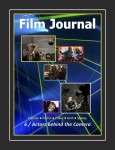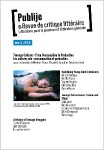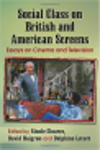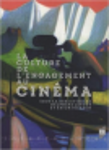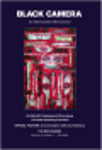Publications
Publications
Publications
OUVRAGES
Ouvrage individuel
Delphine Letort, Barry Jenkins and the Legacies of Slavery. The Serial Adaptation of The Underground Railroad, Lanham, Lexingon Book, 2023.
|
|
The Spike Lee Brand: A Study of Documentary Filmmaking, New York, State University of New York Press, 2015. |
|
|
Charlene Regester, Film Journal, 3 (2016). http://filmjournal.org/fj3-regester |
|
|
Ryan Engley, Revue Cercles Juillet 2017-07-24. http://www.cercles.com/review/r80/Letort.html |
|
|
Zachary Ingle, Film & History: An Interdisciplinary Journal, Volume 47, Number 1, Summer 2017 pp. 94-95 https://muse.jhu.edu/article/668297 |
|
|
David Lipson, « Delphine Letort, The Spike Lee Brand: A Study of Documentary Filmmaking », InMedia [En ligne], 6 | 2017. http://journals.openedition.org/inmedia/916 |
|
|
Du film noir au néo-noir : mythes et stéréotypes de l’Amérique (1941-2008), Paris, Coll. « Sang maudit », L’Harmattan, 2010, 330 p. |
|
|
Recension : Georges Fournier, Revue LISA / LISA e-journal, 2011. https://lisa.revues.org/3929 |
|
|
Recension : Floriane Lopez, « A l’ombre du rêve américain : le film noir et ses formes rémanentes ». http://www.nonfiction.fr/article-3297-a_lombre_du_reve_americain__le_film_noir_et_ses_formes_remanentes.html |
DIRECTION D’OUVRAGES COLLECTIFS OU DE NUMÉROS DE REVUES
- Marie-Christine Michaud, Pauline Pilote, Delphine Letort (dir.), Les États-Unis, entre union et désunion ?, Paris, Les Perséides, 2023.
- Michel Feith, Delphine Letort, Marie-Christine Michaud (dir.), « La Post-Amérique », Revue française d’études américaines, 2022/3 (N° 172), p. 3-20. DOI : 10.3917/rfea.172.0003. https://www.cairn.info/revue-francaise-d-etudes-americaines-2022-3-page-3.htm
- Delphine Letort, Renée Dickason, Michel Prum, Stéphanie Belanger (Eds.) Mediating the Unsaid of War, Revue LISA/LISA E-journal, Vol. 20-N°53, 2022. https://doi.org/10.4000/lisa.13859
- Renée Dickason, Delphine Letort, Michel Prum, Stéphanie Belanger (Eds.), War and Remembrance, Montreal, McGill University Press, 2022.
- Eliane Elmaleh, Benaouda Lebdai, Delphine Letort (Dir.), Rémanences de l’esclavage dans les arts, les littératures et les musées, Rennes, PUR, 2022.
- Delphine Letort (Ed.), "Introduction: BlacKkKlansman, "On the Right Side of History"?" Black Camera 13, no. 2 (2022): 203-206. https://doi.org/10.2979/blackcamera.13.2.10.
|
|
Renaud Bouchet, Hélène Lecossois, Delphine Letort, Stéphane Tison, Résurgences conflictuelles. Le travail de mémoire entre art et histoire. Rennes, PUR, 2021. |
|
|
Delphine Letort and Nicole Cloarec (eds.), « Actors Behind the Camera », Film Journal # 6, 2020. http://filmjournal.org/wp-content/uploads/2020/06/FJ6.1-Nicole-Cloarec-Delphine-Letort-Actors-Behind-the-Camera-Introduction.pdf |
|
|
Delphine Letort (Dir.), Des révoltes armées au terrorisme à l’écran, Coll. CinémAction n° 170, Condé sur Noireau, Éditions Corlet, 2019. |
|
|
Delphine Letort and Joanny Moulin (Eds.), « Political Biographies in Literature and Film », Biography : an Interdisciplinary Quarterly, Univ. of Hawai’i Press, Summer 2018. http://muse.jhu.edu/article/711202 |
|
|
Heather Braun, Elisabeth Lamothe et Delphine Letort (Dirs.), Les Cultures ado : consommation et production, Numéro Publije, 2018. http://revues.univ-lemans.fr/index.php/publije/ |
|
|
Delphine Letort and Benaouda Lebdai (Eds.), Women Activists and Civil Rights Leaders in Auto/biographical Literature and Cinema, Basingstoke, Palgrave Macmillan, 2018. |
|
|
Delphine Letort et Benaouda Lebdai (Dir.), Auto/biographies historiques dans les arts, Coll. Res Anglophonia, Paris, Mare et Martin, 2017. |
|
|
Delphine Letort et Taïna Tuhkunen (Dir.), « Inspiré d’une vie » : le genre biopic en question, Revue Lisa/Lisa e-Journal, Vol. XIV-n°2, 2016. https://lisa.revues.org/8947 |
|
|
Nicole Cloarec, David Haigron, Delphine Letort (Eds.), Social Class on British and American Screens, Essays on Cinema and Television, Jefferson NC, McFarland, 2016. |
|
|
Delphine Letort et Erich Fisbach (Dir.), La Culture de l’engagement au cinéma, Rennes, Presses universitaires de Rennes, 2015. |
|
|
Delphine Letort (Ed.), Postcolonial Filmmaking in French-Speaking Countries, Black Camera, 5 n°3, Bloomington, Indiana University Press, Fall 2014. |
|
|
Delphine Letort (Dir.), Panorama mondial du film noir, CinémAction, Condé-sur- Noireau, Éditions Corlet, 2014. |
|
|
Delphine Letort et Shannon Wells-Lassagne (Dir.), L’Adaptation cinématographique : premières pages, premiers plans, Res Anglophonia, Paris, Mare & Martin, 2014. |
|
|
Delphine Letort et Georges Fournier (Dir.), Les Pratiques documentaires : entre propagande et contestation, Revue LISA. /LISA e-journal, vol. XII - n°1, 2014. URL : http://lisa.revues.org/5570 |
|
Delphine Letort and Georges Fournier (Eds.), Exploring War Memories in American Documentaries, Revue InMedia [En ligne], 4 | 2013. URL : http://inmedia.revues.org/702 |
ARTICLES DE REVUES AVEC COMITÉ DE LECTURE
- Delphine Letort, “Get out from the Horrors of Slavery”, Black Camera, vol. 14, no 2, 2023, 295-307. DOI: 10.2979/blackcamera.14.2.17
- Delphine Letort, “Screening Drone Warfare”, Revue LISA/LISA e-journal, vol. 20-n°53 | 2022. DOI : https://doi.org/10.4000/lisa.14015
- Delphine Letort, “Introduction”, Mediating the Unsaid of War, Revue LISA/LISA E-journal, Vol. 20-N°53, 2022. https://doi.org/10.4000/lisa.13859
- Delphine Letort, « Adapting BlacKkKlansman: ‘Based upon some fo’ real, fo’ real sh*t’ », Black Camera 13, no. 2 (2022): 207-233. muse.jhu.edu/article/851876
- Delphine Letort, « Frederick Wiseman : la fiction réaliste de l’espace social », La Furia Umana /42, 2021. https://web.archive.org/web/20220404085150/http://www.lafuriaumana.it/index.php/76-archive/lfu-42/1063-delphine-letort-frederick-wiseman-la-fiction-realiste-de-l-espace-social
- Avec Abderrahmene Bourenane, « The Figure of the Radicalized Girl in Francophone and other European Cinemas », Studies in European Cinema, 2020. DOI : 10.1080/17411548.2020.1726665
- Avec Shannon Wells-Lassagne, « Reviewing Mildred Pierce (Todd Haynes, HBO, 2011) in the Age of Postfeminism », Journal of Popular Film and Television, 2019, 47:3, 171-178, DOI: 1080/01956051.2018.1549015
- « 13 Reasons Why the Rape Myth Survives », Girlhood Studies: an Interdisciplinary Journal, Volume 12, Issue 2, August 2019, 17-31. https://www.berghahnjournals.com/view/journals/girlhood-studies/12/2/ghs120203.xml
- “The Historical Record and the American Imaginary: Adapting History in Selma.” Black Camera, vol. 10, no. 2, 2019, pp. 195–210. JSTOR, jstor.org/stable/10.2979/blackcamera.10.2.15.
- « The Birth of a Nation (Nate Parker, 2016): The Tale of Nat Turner’s Rebellion », Transatlantica [Online], 1 | 2018. http://journals.openedition.org/transatlantica/12096
- Delphine Letort and Joanny Moulin, “Introduction to Political Biography in Literature and Cinema”, Biography: An Interdisciplinary Quarterly, University of Hawai‘i Press, 2018, 41 (3), 607-612. https://uhpress.hawaii.edu/title/bio/.
- « Adapting John Green : from Print to Screen », in Heather Braun, Elisabeth Lamothe et Delphine Letort (Dir.), Les Cultures ado : consommation et production, Numéro Publije, 2018. http://revues.univ-lemans.fr/index.php/publije/article/view/46
- Avec Charles Joseph, « Tom Perrotta’s The Leftovers in Textual Seriality: Trauma, Resilience... Resolution? », in Shannon Wells-Lassagne (Dir.), Littérature et Série télévisées, TV/Series [Online], 12 | 2017. http://journals.openedition.org/tvseries/2170
- « Flirting with Controversy : Making Biopics about Truman Capote », in Delphine Letort et Taïna Tuhkunen (Dir.), « Inspiré d’une vie » : le genre biopic en question, Revue Lisa/Lisa e-journal, XIV-n°2, 2016. https://lisa.revues.org/8973
- « Spike Lee’s Documentaries: The Creative Art of Making Nonfiction», Black Camera, Vol. 8, N°1, Bloomington, Indiana University Press, Fall 2016, 9-26. http://www.jstor.org/stable/10.2979/blackcamera.8.1.0009?seq=1#pagescantabcontents
- « Conspiracy Culture in Homeland (2011-2015) » in Media, War and Conflict, July 11, 2016. http://mwc.sagepub.com/content/early/2016/07/04/1750635216656968.full.pdf?ijkey=1Zh9sS4kwp1g3cP&keytype=finite
- « Questioning the Jury System through The Staircase (Xavier de Lestrade, 2008)», in America: Justice, Conflict, War, Amanda Gilroy and Marietta Messmer (Dir.), European Views of the United States, 8, Heidelberg, Universitätsverlag Winter, 2016, 247-258.
- « The Cultural Capital of Sofia Coppola’s The Bling Ring (2013): Branding Feminine Celebrity in Los Angeles», Celebrity Studies, London, Taylor & Francis, 14, 2015. http://www.tandfonline.com/doi/full/10.1080/19392397.2015.1119657
- « Age and Gender in the Miniseries Adaptation of Elizabeth Strout’s Olive Kitteridge », Adaptation, Oxford University Press, October 21, 2015. URL : http://adaptation.oxfordjournals.org/content/early/2015/10/20/adaptation.apv022.full.pdf?keytype=ref&ijkey=6PxDgJAZhj6mWW4
- « First Glances at Mildred Pierce (James M. Cain, 1941): Adapting Hardboiled Melodrama», Screen 2015, 56 (2): 262-268. URL : http://screen.oxfordjournals.org/cgi/content/full/hjv030? ijkey=7L043zpYstmLUi9&keytype=ref
- Co-écrit avec Emmanuelle Cherel, « Women on the Algerian Art Scene: Interrogating the Postcolonial Gaze through Documentary and Video Art», Black Camera, Fall Issue 2014, Bloomington, Indiana University Press. URL: http://www.jstor.org/stable/10.2979/blackcamera.6.1.193
- « Rethinking the Diaspora through the Legacy of Slavery in Rachid Bouchareb’s Little Senegal», Black Camera, Fall Issue 2014, Bloomington, Indiana University Press. URL: http://www.jstor.org/stable/10.2979/blackcamera.6.1.139
- « Agnès Varda and the Black Panthers’ Struggle: Huey and Black Panthers», 1968, Françoise Coste (Dir.), Revue ORDA (L’Ordinaire des Amérique), Décembre 2014. URL : https://orda.revues.org/1646
- « From the Control Room to the Headlines in The Newsroom», Television Series and Narratology: New Avenues in Storytelling, Georges-Claude Guilbert et Shannon Wells-Lassagne (Dir.), Graat On-Line Issue 15, April 2014, pp. 7-24. URL : http://www.graat.fr/1letort.pdf
- « Les Documentaires politiques de Robert Greenwald : définir des nouvelles pratiques militantes à l’ère d’Internet », in Delphine Letort et Georges Fournier (dir), Les Pratiques documentaires : entre propagande et contestation, Revue LISA/LISA e-journal [En ligne], vol. XII-n° 1 | 2014. URL : http://lisa.revues.org/5692
- « The War Tapes (Deborah Scranton, 2006) : Documenting War with Digital Cameras », in Delphine Letort & Georges Fournier (Dir.), Exploring War Memories in American Documentaries, from Film Archives to Digital Filmmaking, InMedia 4, 2013. URL : http://inmedia.revues.org/729
- « Looking Back into Abu Ghraib: Standard Operating Procedure (Errol Morris, 2008) », Media, War and Conflict, Volume 6, Issue 3, December 2013, pp. 221-232. URL : http://mwc.sagepub.com/content/6/3/221.abstract
- « The Tales of New Orleans after Katrina: Fact and Fiction in Treme», in Abigail Keating, Deborah Mellamphy and Jill Murphy (Dirs.), Cinema in the Interstices, Alphaville Journal, Cork, July 2013. URL : http://www.alphavillejournal.com/Issue5/HTML/ArticleLetort.html
- « Sankofa (Haile Gerima, 1993) : la mémoire de l’esclavage dans la conscience diasporique », Transatlantica, 2 | 2012. URL : http://transatlantica.revues.org/6058
- « The Rosa Parks Story (Julie Dash, 2002) : The Making of a Civil Rights Icon », Black Camera, Spring Issue 2012, Bloomington, Indiana University Press, pp. 31-50. URL : http://www.jstor.org/stable/10.2979/blackcamera.3.2.31
- « Paranoid Park (Gus Van Sant, 2007) : expérience filmique de l’adolescence », in Anne-Marie Paquet-Deyris et Dominique Sipière (Dir.), La Parole au cinéma, Cahiers du Ciclaho, Nanterre, 2012, pp. 445-462.
- « Smoke (Paul Auster et Wayne Wang, 1995) : une œuvre à la croisée des arts », Transatlantica, 2 | 2010. URL : http://transatlantica.revues.org/5113
- « Sweet Sweetback’s Baadasssss Song (Melvin Van Peebles, 1971) : Exégèse d’un film militant », in Eliane Elmaleh (Dir.), Usages et contre-usages du stéréotype chez les Afro-américains Revue LISA - Vol. VII - n° 1, 2009, Presses Universitaires de Caen, pp. 74-88. URL : http://lisa.revues.org/index790.html
- « Diverging Interpretations of Charlotte Brontë’s Jane Eyre (1843) : Franco Zeffirelli’s and Robert Stevenson’s Screen Adaptations », in Charlotte Borie et Elise Ouvrard (Dir.), Jane Eyre : texte, contexte, ur-texte, Revue LISA - Vol. VII - n° 4, 2009, Presses Universitaires de Rennes, pp. 123-138. URL : http://lisa.revues.org/index848.html
- « Daughters of the Dust (Julie Dash, 1991) : le récit d’esclave revisité », in Severiano Rojo Hernandez (Dir.), Femmes et Militantisme, Revue AMNIS - Vol. n° 8, Presses Universitaires de Brest, 2008, pp. 183-198. URL : http://amnis.revues.org/623
CHAPITRES D’OUVRAGES
- Delphine Letort, « Show Me a Hero on the Color Line », Marie-Christine Michaud, Pauline Pilote, Delphine Letort (dir.), Les États-Unis, entre union et désunion ?, Paris, Les Perséides, 2023, 127-140.
- Delphine Letort, “Celebrity: the Aesthetics of Performance”, in Suzanne Ferriss (Ed.), The Bloomsbury Handbook to Sofia Coppola, London, Bloomsbury Academic, 2022, 371-382.
- D. Letort and A. Bourenane, “Representing Islamic Fundamentalism in French and Algerian Cinema” in Ramona Mielusel (Ed.), Artistic (Self)-Representations of Islam and Muslims, Perspectives Across France and the Maghreb, London Palgrave Macmillan, 2022, 61-78.
- Delphine Letort, « L’Histoire de la traite à l’écran : les révoltés du Passage du Milieu », dans Eliane Elmaleh, Benaouda Lebdai, Delphine Letort (dir.), Rémanences de l’esclavage dans les arts, la littérature et les musées, Rennes, PUR, 2022, 105-118.
- Delphine Letort, « Homeland (2011-2012) : Au cœur du complot », in Anne-Marie Paquet-Deyris et Dominique Sipière (eds.), Vérités et mensonges dans le cinéma et les séries hollywoodiens, Nanterre, Presses Universitaires de Nanterre, 2021.
- Delphine Letort, “The Femme Fatale of the 1990s Erotic Thriller: a Post-feminist Killer ?”, in David Roche and Cristelle Maury (Eds.), Women Who Kill in Film and Series of the Postfeminist Era, London, I. B. Tauris, 2020, 33-47.
- Delphine Letort, “Adapting Nordic Noir: From Forbrydelsen to The Killing”, in Stacy Gillis & Gunnþórunn Guðmundsdóttir (Eds.), Noir in the North: Genre, Politics, and Place, London, Oxford, New York, Bloomsbury, 2020.
- Delphine Letort, “Sur la route de Little Miss Sunshine : Du film de famille au road movie », in Taïna Tuhkunen (dir.), Entre drames, crises et rires : raconter la famille à l’écran, Quaina #13, https://quaina.univ-angers.fr/2023/06/16/sur-la-route-de-little-miss-sunshine-du-film-de-famille-au-road-movie/
- « Frederick Wiseman : la fiction réaliste de l’espace social »
- « The Femme Fatale of the 1990s Erotic Thriller: a Post-feminist Killer ? », in David Roche and Cristelle Maury (Eds.), Women Who Kill in Film and Series of the Postfeminist Era, London, I. B. Tauris, 2020.
- Avec Charles Joseph, « How to End with an Opening: TV Series Continuity and Metadaptation”, in Shannon Wells-Lassagne and Armelle Parey (Eds.), Ending Adaptations, New York and London, Routledge, 2019.
- « Les révoltes d’esclaves à l’écran », in Delphine Letort (Dir.), Des révoltes armées au terrorisme, Condé-sur-Noireau, Coll. CinémAction n° 170, Condé sur Noireau, Éditions Corlet, 2019.
- « L’Algérie pendant la décennie noire : un cinéma contre l’oubli », in Delphine Letort (Dir.), Des révoltes armées au terrorisme, Condé-sur-Noireau, Coll. CinémAction n° 170, Condé sur Noireau, Éditions Corlet, 2019.
- Avec Christophe Gelly, « Women’s Song and Dance Performances in Film Noir », in Alain Silver et James Ursini (Eds.), Film Noir : Light and Shadow, New York : Applause Theatre & Cinema Books, 2017.
- « Le port de Baltimore dans The Wire», in René Prédal (Dir.), Les Ports à l’écran, Coll. CinémAction, Condé-sur-Noireau, Editions Corlet, 2017.
- « Documenting Stories of Reconstruction in New Orleans: Spike Lee and Jonathan Demme», in Evangelia Kindinger and Simon Dickel (Eds.), After the Storm, Bielefeld, Transcript Verlag, 2015, pp. 25-39.
- « Charles Starkweather and Caril Ann Fugate: From the Media Headlines to the Movies», in Martin Barnier, Trudy Bolter, Rémy Fontanel, Isabelle Le Corff (Dir.), Les Biopics de tueurs, Lyon, Aléas, 2014.
- « Le Noir en série au Danemark : Forbrydelsen», in Delphine Letort (Dir.), Panorama mondial du film noir, Coll. CinémAction, Condé-sur-Noireau, Editions Corlet, 2014, pp. 162-169.
- « Les Romans de James Ellroy à l’écran », in Delphine Letort (Dir.), Panorama mondial du film noir, Coll. CinémAction, Condé-sur-Noireau, Editions Corlet, 2014, pp. 48-55.
- « Les Méchants du ghetto : les dealers de Clockers (Spike Lee, 1995) », in Karine Hildenbrand et Christian Gutleben (Dir.), Le Méchant à l’écran les paradoxes de l’indispensable figure du mal, Paris, L’Harmattan, 2013, pp. 139-156.
ACTES DE COLLOQUES
- The Ku Klux Klan on Screen and the Troubles of Reception
- « Adapting Nordic Noir: From Forbrydelsen to The Killing», in Stacy Gillis & Gunnþórunn Guðmundsdóttir (Eds.), Noir in the North : Genre, Politics, and Place, London, Oxford, New York, Bloomsbury, 2020.
- « The Ethics of Truth in Biographical Documentaries », in Joanny Moulin, Nguyen Phuong Ngoc et Yannick Gouchan (Dir.), La Vérité d’une vie. Etudes sur la véridiction en biographie, Paris, Honoré Champion, 2019, 171-188.
- « The Many Lives of Ida B. Wells: Autobiography, Historical Biography, and Documentary », in Delphine Letort et Benaouda Lebdai (Ed.), Women Activists and Civil Rights Leaders in Auto/biographical Literature and Cinema, Basingstoke, Palgrave Macmillan, 2018.
- « Rome plutôt que vous (Roma walla n’touma, Tariq Teguia, 2007) : la guerre invisible à l’écran », in Benaouda Lebdai (Dir.), L’Histoire dans les littératures et les arts africains, Alger, Editions ENAG, 2017.
- « Race and Class in Luisa Dantas’s Land of Opportunity (2011)», in Nicole Cloarec, David Haigron, Delphine Letort (Eds.), Social Class on British and American Screens, Essays on Cinema and Television, Jefferson NC, McFarland, 2016.
- « Filmer la lutte ouvrière : Harlan County, USA (Barbara Kopple, 1976) et I Am Somebody (Madeline Anderson, 1969) », in Delphine Letort et Erich Fisbach (Dir.), La Culture de l’engagement au cinéma, Rennes, Presses Universitaires de Rennes, 2015.
- « Spike Lee et le documentaire : les voix citoyennes et la reconstruction de la Nouvelle Orléans », in Eliane Elmaleh et Jean Philippe Melchior (Dir.), L’Engagement citoyen, Le Mans, Editions Cénomanes, 2014, pp. 165-176.
- « Into the Wild: Framing the Wilderness », in Delphine Letort et Shannon Wells-Lassagne (Dir.), L’Adaptation cinématographique: premières pages, premiers plans, Paris, Mare et Martin, 2014, pp. 111-129.
- « The Writing of a Film Noir : Ernest Hemingway and The Killers», in Shannon Wells-Lassagne and Ariane Hudelet (Dir.), Screening Text, Critical Perspectives on Film Adaptation, London, McFarlane, 2013, pp. 53-65.
- « America, America (Elia Kazan, 1961) : la mémoire de l’exil », in Antoine Fraile (Dir.), Cinéma et exil, Revue QUAINA, n°3, 2011. URL : http://quaina.univ-angers.fr/spip.php?article30
- « Kiss Me Deadly (Robert Aldrich, 1955) : Le consensus atomisé », in Antoine Fraile (Dir.), Le Cinéma historique d’époque : Histoire-propagande-mémoire collective, Revue QUAINA, n°1, mars 2010. URL : http://quaina.univ-angers.fr/spip.php?article9
- «Femme fatale/femme assassine dans le film noir : dévier le stéréotype », in Karine Hildenbrand (Dir.), Figures de femmes assassines – Représentations et idéologies, Revue CYCNOS, Université de Nice, Volume 23, n° 2, Novembre 2006, pp. 147-159. URL : http://revel.unice.fr/cycnos/?id=705
INVITATIONS
- Invitation de Fiona Handyside pour une conférence plénière intitulée « The New Black Film-Horror Genre : Jordan Peele’s Get Out and Us»
- Invitation d’Anne-Claire Faucquez pour une journée d’études sur l’esclavage dans les arts à Amiens le 30 mars 2019. Conférence intitulée : « Get Out from the Horrors of Slavery »
- Invitation pour une conférence plénière « BlacKkKlansman: le cinéma anti-Trump » par le CICLAHO (Groupe de Recherche sur le Cinéma Classique Hollywoodien), Université de Paris Ouest Nanterre La Défense, 15 mars 2019.
- Invitation pour une conférence plénière intitulée (dans le cadre des « Common Talk » du campus) « 13 Reasons Why Girls Matter », University of Farmington in Maine, 13 février 2019.
- Invitation pour une conférence plénière intitulée « Is BlacKkKlansman Doing the Right Thing ? », University of Farmington in Maine, 9 février 2019.
- Invitation de Stéphanie Bélanger pour une conférence plénière intitulée « Drone Trauma : Watching a Good Kill » lors du colloque Mémoires de guerre : commémorations, reconstitutions, représentations, récits de guerres dans le monde anglophone (XVIIIe-XXIe siècles), organisé par Stéphanie Bélanger, Renée Dickason, Michel Prum, Florence Binard, et Gilles Teulié, Royal Military College, Kingston, Canada, 12-13 juin 2018.
- Invitation de Marta Ponsa pour interviewer le cinéaste Haile Gerima à l’issue de la projection de Sankofa dans le cadre d’un cycle autour des cinéastes de LA Rebellion (commissaire du cycle : Marie-Pierre Duhamel) au Jeu de Paume (Paris) le 7 avril 2017.
- Invitation du Ministère de la Culture Algérien pour un colloque organisé par Benaouda Lebdai et intitulé La Représentation de l’Histoire dans les arts et les littératures africaines à Alger du 14 au 17 mai 2016. Communication intitulée « Rome plutôt que vous (Tariq Teguia, 2007) : la guerre invisible ».
- Invitation de Stephen Pimpare et Jeffrey Klenotic le 26 avril 2016 à l’Université du New Hampshire (Communications Arts Program/ Politics & Society Program, Manchester, USA) pour une conférence publique intitulée « Spike Lee: The Making of Documentaries » et un débat public autour du film Do the Right Thing (Spike Lee, 1989).
- Invitation de Sarah Hamblin et Sarah Keller le 25 avril 2016 à l’Université du Massachussetts (College of Liberal Arts, Boston, USA) pour une conférence publique intitulée « Spike Lee : Fiction and Nonfiction » et un séminaire « Studying Documentary Filmmaking ».
- Invitation pour un séminaire du CLIMAS (U. Bordeaux Montagne) sur « Spike Lee : de la marge à la norme » le 27 novembre 2015.
- Invitation pour une conférence publique sur « Les documentaires de Spike Lee : un réalisateur engagé » à l’Institut Franco-Américain, Rennes, 17 février 2015.
- Invitation pour une conférence plénière « Spike Lee: du documentaire et de la fiction » par le CICLAHO (Groupe de Recherche sur le Cinéma Classique Hollywoodien), Université de Paris Ouest Nanterre La Défense, 29 Novembre, 2014.
- Invitation pour une conférence plénière intitulée « Remembering the Civil Rights Movement through the Nonfiction Films of Madeline Anderson » lors d’une Journée d’Étude, Mémoire(s) du mouvement pour les droits civiques, 28 février 2014, Université de Toulouse (GENA CAS – EA801/SMS-Humanités – MémoCri).
- Invitation pour une conférence intitulée « Sankofa (Haile Gerima, 1993) : retour sur l’esclavage » lors d’une Journée d’Étude, ARTfrocentrisme : représentations artistiques et imaginaires de l’Afrique, Musée du Quai Branly, 1 et 2 décembre 2011.
- Invitation pour une conférence publique sur « James Ellroy et le film noir ». à l’Institut Franco-Américain, Rennes, 24 février 2011.
COMMUNICATIONS DANS DES COLLOQUES
- « Le Passage du Milieu : réécritures et refoulements », Colloque Les Mémoires de l’esclavage dans les arts et la littérature, Université d’Abomey-Calavi, Bénin, 2-9 février 2020.
- « Reinventing the Political Biopic in Show Me a Hero (Paul Haggis, 2015) », MoVIES - Au-delà du Biopic hollywoodien, nouvelles approches des vies filmées, Université d’Aix-en Provence, 17-19 octobre 2019.
- « The KKK in Films and the Troubles of Reception », Congrès de la Sercia, Université de Brest, 5-7 septembre 2019.
- « Danielle Macdonald: What does it mean to be a girl ? », GaMeS workshop, Exeter University, 13 septembre 2019.
- « Coppola’s Advertising Aesthetics and Postfeminism», Colloque Contemporary Directors Symposium : Sofia Coppola, University of Sussex, 16 mai 2018.
- « Little Miss Sunshine (Jonathan Dayton et Valerie Faris, 2006): réinventer la famille », Colloque Familles en images : entre regards et récits, Université d’Angers, 11-12 janvier 2018.
- « Slave Rebels on Screen », Colloque Mémoires de l’esclavage et de la colonisation : Arts, Historiographie, Musées, Le Mans Université, 9-10 Nov. 2017.
- « The Ethics of Truth in Biographical Documentaries », Colloque La Vérité d’une vie, Université d’Aix-Marseille, 19-21 octobre 2017.
- « Struggling with Mortality in Young Adult Novels and Films », Colloque Teenage Kicks, Université de Kingston-Upon-Thames (GB), 9-10 septembre 2017.
- « Filmer les lois de l’ordre social : Wiseman et les couleurs du pluralisme culturel », Journée d’étude sur Frederick Wiseman, Université du Toulouse-Jean Jaurès, 19 mai 2017.
- « Danish Noir in Television Series », Colloque Noir in the North, University of Iceland, 16-17 novembre 2016.
- « John Green and Teenage Culture », Colloque The Cultural Landscape of Teenagers, Université du Maine, 23-24 juin 2016.
- « Political Animals: Adapting the Biopic into Television Miniseries », Colloque Adaptation in the Arts: Theory and Practice, Université de Farmington (Maine, USA), 28-29 avril 2016.
- « Jack Nicholson: Age and Gender », Congrès de la SERCIA Masculin/Féminin, Arras, 3-5 septembre 2015.
- « Truman Capote (Bennett Miller, 2005): a Life-Changing Story », Congrès de l’AFEA, Université de la Rochelle, 28-30 mai 2015.
- «The Many Lives of Ida B. Wells », Colloque Historical Auto/biographies in the Arts, Université du Maine, 25-27 mars 2015.
- Avec Charles Joseph, « Tom Perrotta’s The Leftovers in Textual Seriality: Trauma, Resilience... Resolution? », Colloque Littérature et séries, Université de Lorient, 26-28 mars 2015.
- « The Adaptation of Olive Kitteridge (Elizabeth Strout, 2008) », Journée d’études Biopic Adaptations, De Montfort University à Leicester (UK), 24 février 2015.
- « Consuming Los Angeles in The Bling Ring (Sofia Coppola, 2013) », Colloque L’Ouest et les Amériques, Université de Lorient, 10-11 octobre 2014.
- « John Cassavetes : Filming Deviating Women », Colloque « Deviate ! », Alphaville : Journal of Film and Screen Media Conference, Université de Cork, 4-6 Septembre 2014.
- « Questioning the Jury System through The Staircase (Xavier de Lestrade, 2008)», Congrès de l’European Association of American Studies (EAAS), Université de La Haye, Pays-Bas, 3-5 avril 2014.
- « Serialization of the Documentary : Telling the Story of Katrina in When the Levees Broke: A Requiem in Four Acts (Spike Lee, 2006) and Its Sequel If God Is Willing And Da Creek Don’t Rise (Spike Lee, 2010) », Colloque After the Storm: The Cultural Politics of Hurricane Katrina, Ruhr-University Bochum, Allemagne, 6-7 décembre 2013.
- « Little Senegal (Rachid Bouchareb, 2001) : la famille diasporique », Journée d’Étude, La Représentation du sujet postcolonial dans les arts, Université du Maine, 29 novembre 2013.
- « La Lutte ouvrière à travers le documentaire : Barbara Kopple et Madeline Anderson », Colloque L’Engagement au cinéma, Université d’Angers, 22-23 novembre 2013.
- « Viewing the Reconstruction of New Orleans : From Spike Lee to Jonathan Demme », Colloque La Nouvelle-Orléans: la cité décalée, Université d’Aix-en-Provence, 7-9 novembre 2013.
- « Screening Race and Class in Land of Opportunity (Luisa Dantas, 2010-2011) », Colloque La représentation des classes sociales dans les films de fiction et de nonfiction, du grand et du petit écrans dans les pays anglophones, Université Rennes 2 Haute Bretagne, 10-11 octobre 2013.
- « Standard Operating Procedure (Errol Morris, 2008) : Disciplining the prisoner’s body in Abu Ghraib », Colloque Captivity and Culpability, Senate House, Londres, 14-15 décembre 2012.
- « New Orleans after Katrina : fiction and nonfiction », Colloque Cinema in the Interstices, Alphaville: Journal of Film and Screen Media Conference, Université de Cork, Irlande, 7-9 septembre 2012.
- « Into the Wild (Jon Krakauer, 1996 ; Sean Penn, 2008) : Framing the American Wilderness », Colloque De la page blanche aux salles obscures : l’adaptation cinématographique dans le domaine anglophone: premières pages, premiers plans, Université du Maine, 20-21 juin 2012.
- « Huey P. Newton : The Black Panthers Icon », Congrès de l’AFEA, Héritage(s), Université de Perpignan, 23 -27 mai 2012.
- « En quête de transparence dans les documentaires sur le Vietnam », Congrès de la SAES, La Transparence, Université de Limoges, 10-13 mai 2012.
- « Les documentaires historiques de Spike Lee », Invitation par l’Association des Etudiants en Histoire (AEH), Université du Maine, 10 janvier 2012.
- « Spike Lee’s Documentaries : African American History », colloque Backward Glances : History, Memory and Imagination, Université de Cork, Irlande, 31 août-1 septembre 2011.
- « America America (Elia Kazan, 1963) : récit d’exil », Journée d’Étude, Exil et cinéma, Université d’Angers, 13 mai 2011.
- « Robert Greenwald : documentaire et militantisme », séminaire présenté dans le cadre des activités du 3L.AM, Université du Maine, 21 avril 2011.
- « Theorizing conspiracy in Spike Lee’s Documentary When the Levees Broke: A Requiem in Four Acts (2006) », Journée d’Étude, Le Faux, Université de Rennes 2, 22 octobre 2010.
- « Julie Dash and Spike Lee : Screening the Civil Rights Struggle », Congrès de la SERCIA, La Mémoire au cinéma, Université de Besançon, 8-10 septembre 2010.
- « When the Levees Broke: A Requiem in Four Acts (Spike Lee, 2006): New Orleans’s Blurred Horizon », Congrès de la SAES, Horizon, Université de Lille 3, 21-23 mai 2010.
- «Smoke (Paul Auster et Wayne Wang, 1995) : collaboration et création artistiques », Journée d’Étude CPER Texte - Image/Écriture cinématographique - Écrit/Oral/ Études croisées, Université du Maine, 8 janvier 2010.
RECENSIONS
- Fiona Handyside, Sofia Coppola, A Cinema of Girlhood , Revue LISA/LISA e-journal [En ligne], vol. XVI-n°2 | 2018. URL : http://journals.openedition.org/lisa/10367
- Avec Ana-Catharina Santos Silva, Black Camera, Vol. 8, No. 2 (Spring 2017), pp. 290-295.
- Nadia Field, Jan-Christopher Horak, and Jacqueline Najuma Stewart (Dir.), L.A. Rebellion: Creating a New Black Cinema, Berkeley, CA, University of California Press, 2015. URL: http://www.jstor.org/stable/10.2979/blackcamera.8.2.19
- Ellen C. Scott, Cinema Civil Rights: Regulation, Repression, and Race in the Classical Hollywood Era, New Brunswick, New Jersey, Rutgers University Press, 2015. Black Camera, Vol. 7, No. 2 (Spring 2016), pp. 243-245. URL: http://www.jstor.org/stable/10.2979/blackcamera.7.2.243
- Wes D. Gehring, Chaplin’s War Trilogy, An Evolving Lens in Three Dark Comedies, 1918-1947, Jefferson, North Carolina, McFarland, 2014, 232 p. Revue Cercles. URL: http://www.cercles.com/review/r74/Gehring.html
- Donna Kornhaber, Charlie Chaplin, Director, Evanston, Illinois, Northwestern University Press, 2014, 341 p. Revue Cercles. URL: http://www.cercles.com/review/r74/Gehring.html
- Marie-Hélène Bacqué, Amélie Flamand, Anne-Marie Paquet-Deyris, Julien Talpin (Dir.), The Wire, L’Amérique sur écoute, Paris : La Découverte, 2014, 265 p. Revue Cercles. URL : http://www.cercles.com/review/r71/AMPD.html
- Devorah Heitner, Black Power TV, Durham and London: Duke University Press, 2013, 190 p. Black Camera, vol. 5, no. 2, 2014, pp. 197–200. URL : http://www.jstor.org/stable/10.2979/blackcamera.5.2.197
- Amanda Ann Klein, American Film Cycles Reframing Genres, Screening Social Problems, & Defining Subculture, Austin, University of Texas Press, 2011, 255 p. Revue Mise au Point. URL : http://map.revues.org/1449
- Violaine Roussel, Art vs War, Les artistes américains contre la guerre en Irak, Paris, Presses Universitaires de Sciences Po, 2011, 314 p. Revue InMedia. URL : http://inmedia.revues.org/472
- Fran Mason, Hollywood’s Detectives, Crimes Series in the 1930s and 1940s from the Whodunnit to Hard-Boiled Noir, Basingstoke, Hampshire, UK : Palgrave MacMillan, 2012, 187 p. Revue Cercles. URL : http://www.cercles.com/review/r59/Mason.html
- Serge Chauvin, Les Trois vies des Tueurs : Siodmak, Siegel et la fiction (Pertuis : Rouge Profond, 2010, 190 p. Revue Cercles. URL : http://www.cercles.com/review/r50/Chauvin.html
- Brian A. Monahan, The Shock of the News, Media Coverage and the Making of 9/11, New York & London, New York University Press, 2010, 221 p. Revue InMedia. URL : http://inmedia.revues.org/479





